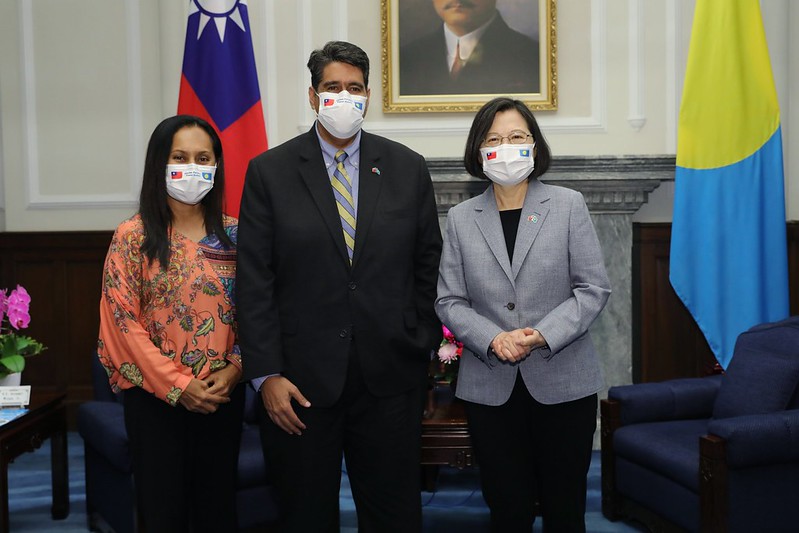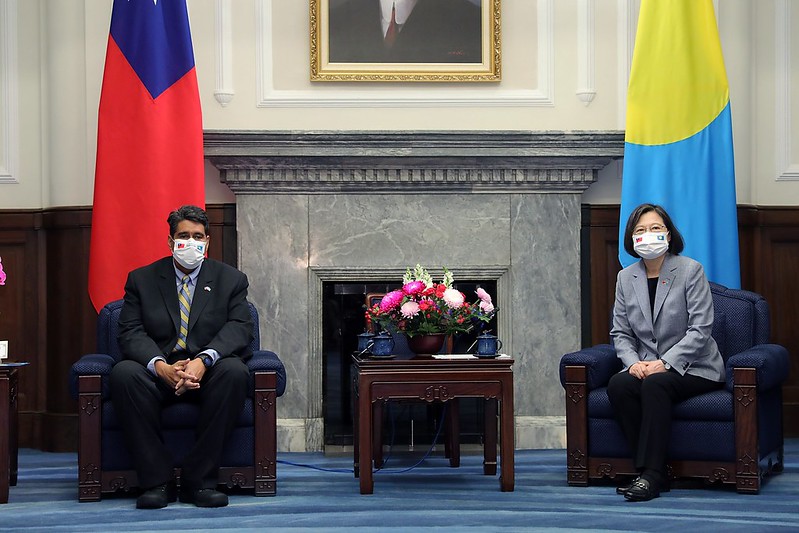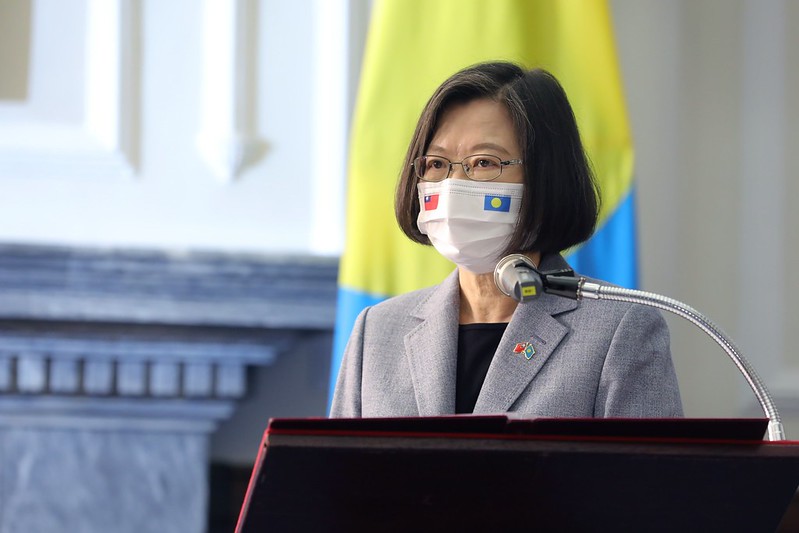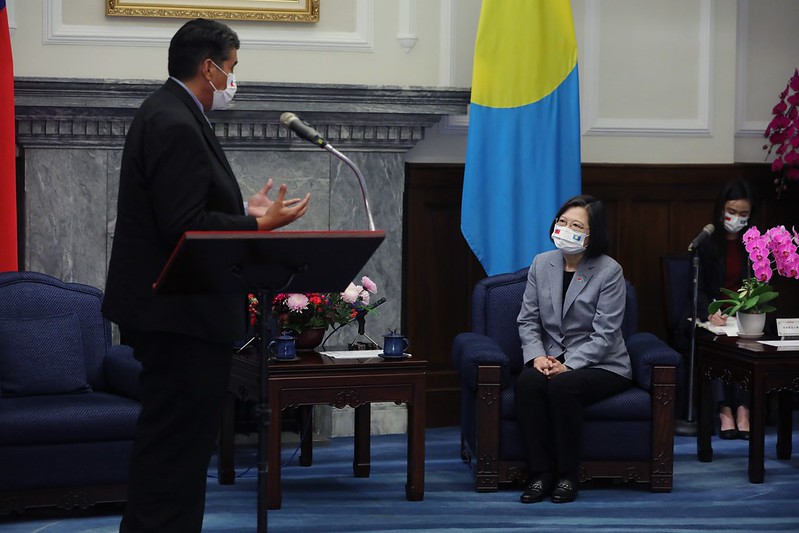News & activities
 News releases
News releases
On the afternoon of March 30, President Tsai Ing-wen met with Palau President Surangel Whipps Jr. and First Lady Valerie Whipps at the Presidential Office in Taipei, and welcomed the forthcoming launch of the Taiwan-Palau travel bubble as a historic moment for cooperation between the two countries. President Tsai expressed confidence that the launch of the travel bubble would show the world that safe travel is possible during this stage of the pandemic, and said she looks forward to maintaining close bilateral ties in the post-pandemic era as Taiwan and Palau build a better future together.
A translation of President Tsai's remarks follows:
I would like to extend a warm welcome to President Whipps, First Lady Whipps, and the delegation from Palau. This is President Whipps' first trip abroad since taking office, as well as the first time that Taiwan has received a foreign head of state since the outbreak of the COVID-19 pandemic.
President Whipps, allow me to congratulate you once again on your election, and let me also note that this is a historic moment for cooperation between the Republic of China (Taiwan) and the Republic of Palau.
The day after tomorrow, April 1, will mark the opening of the Taiwan-Palau travel bubble. Amid the challenges posed by the pandemic, this model for a safe travel corridor is being closely watched not just by the people of our two countries, but by the entire world.
As you pointed out, President Whipps, it is Taiwanese travelers who are being given the exclusive opportunity to visit Palau. And we know that many people in Taiwan have been looking forward to visiting your country.
I would like to take this opportunity to thank you for your commitment to strengthening Taiwan-Palau ties. Minister of Foreign Affairs Joseph Wu (吳釗燮) told me how you led efforts to set up this travel bubble by personally chairing meetings to promote the plan and inviting officials from our Embassy in Palau to discuss planning.
We discussed arrangements for a travel bubble when we spoke via video call in January. I am very pleased that just two months later, we are here receiving you and your delegation in Taiwan.
Your itinerary in Taiwan has included a tourism promotion event as well as a number of exchanges with local businesses. These events help draw Taiwanese public attention to Palau and the beauty of your nation.
I understand that you have a specific goal—to increase the number of Taiwanese visiting Palau to 100,000 per year. I believe that with the launch of this travel bubble, we will make a big step toward that goal, while also showing the world that safe travel is possible during this stage of the pandemic.
I can personally recommend Palau as a tourist destination. I visited Palau not long ago, and was deeply impressed by its ocean views, traditional culture, and commitment to environmental protection. I strongly encourage Taiwanese to visit Palau, and look forward to going there again myself.
Of course, even as we promote tourism, we must remain on guard against the pandemic. Over the past year, our countries have been united in our work to combat the spread of COVID-19. Both the public and private sectors in Taiwan have donated medical resources to Palau, and a medical team from Shin Kong Wu Ho-Su Memorial Hospital has assisted Palau in maintaining its impressive record of zero confirmed cases.
From disease prevention to tourism, our cooperation highlights the long-standing mutual trust between our countries, on which we have built a reliable model for cooperation. Looking forward, I know that we will continue to enjoy further success in our exchanges in medicine, energy, education, maritime security, and Austronesian culture.
President Whipps, the gift I will present to you today is a symbol of that trust and cooperation—a traditional knife used by members of Taiwan's indigenous Paiwan tribe to share food and forge mutual bonds. It is my hope that in the post-pandemic era, Taiwan and Palau will enjoy even closer ties as we create a better future together.
In closing, let me once again welcome President Whipps, First Lady Whipps, and the members of the Palauan delegation to Taiwan. I wish you all a smooth and fruitful visit.
President Whipps then delivered the following remarks:
Madame President Tsai, members of the cabinet and distinguished guests: On behalf of our delegation, I would like to say thank you for the gracious hospitality that has been shown from when we stepped off the plane until now, and I am sure it will continue until we leave. We feel at home here, and we feel very honored and very privileged to be allowed to come into the country during this pandemic to begin what we have been working on for so long. I would like to say that your ambassador in Palau has been working very hard, along with Minister Wu and all of the members of your cabinet, to make sure that this is possible.
I would like to congratulate your government and the people of Taiwan for the success that you have in keeping your country COVID safe. I would say COVID free, because really most of the cases came from outside. So, we look at it as though we are the same.
We have been very fortunate in Palau to look up to you and follow the model that you have, and have had very strict quarantine requirements. To some extent people at home think they are a bit excessive, but it is the safety of the people that has always come first. And I think that goes to show the values that both our countries have––that people must come first. We have to take care of their lives, we have to keep them safe.
Opening up this sterile corridor is all about opening with care and being safe. We know that what we are doing will cause some inconvenience. It is not going to be exactly like travel before. However, we ask for people’s patience, because it is about safety. As we continue to move forward, that will only improve.
This also has to do with trust. I think most importantly having Minister Wu attend the inauguration ceremony helped build confidence in our people. Having the CDC (Taiwan Centers for Disease Control) team come to Palau and see what we have been doing in Palau helped build that confidence.
I hope that our visit here also helps the people here build their confidence that Palau is truly COVID free, and they can see that it will be just like travelling between Kaohsiung and Taipei. That should be our ultimate goal.
We have been very fortunate. What has also helped us in Palau is our partnership with the United States. The US has been able to put us on their vaccine distribution list, so beginning in January, shortly before we talked, I got my first shot and then got my second shot right after the inauguration. So, as of the time we left, 50 percent of the people in Palau had already received their first shot. We hope in the next couple weeks, 50 percent will have already received their second shot. We are well on our way toward herd immunity, and I think that is also what is giving the people in Palau the confidence to welcome the people of Taiwan, even though we are COVID free.
In the past few weeks, a team from the US has helped us with analysis. And President Tsai, I would like to share one of the statistics from that analysis: if we have this travel corridor with Taiwan, the chance of one COVID-19 case coming from Taiwan to Palau is one in four million. So, that is a very low chance of getting COVID-19. And that is because of what you have done here and demonstrated to the world. By having this corridor we can demonstrate to the world how two COVID safe and COVID free countries can work together and increase people-to-people exchanges.
Most importantly for Palau, we have gotten a shot in our arm with the vaccine; by allowing the tourists to come in, you give us a shot in the arm for our economy. That is very important because, as you know, many of our people are out of work because we depend on tourism.
Secondly, and probably more important than that, by allowing regular flights to Palau, we will be able to bring patients to Taiwan. Thank you for allowing us to continue these charter flights and helping us get ready for them. Through the charter flights, we have been sending patients to Taiwan, but in limited numbers, because they are stuck here for a month waiting for the next flight. It is heartbreaking when the people on the committee have to decide who goes and who does not go. By allowing regular flights, people that need critical care can come. In fact, over the past ten years, since we have had this medical program, over 3,000 patients have come for treatment in Taiwan, and this is an important part of our care for our people. So opening up this travel corridor helps us take care of our people and save and extend the lives of those that are very much in need of medical treatment.
Madame President, I would also like to say that this past year has taught us a lot. In particular, I would like to talk about ways that we have innovated to try combat the virus. It was with the help of Taiwan that we got our first PCR machines, and have been able to test and make sure that nobody has the virus. But before that, we had to get the infectious control box shipped to Palau. And there was no way to get it because it was too heavy for aircraft, so it had to be shipped on a fishing boat. But it got there, and that is the amazing part of this story.
Opening up this travel corridor, we had some questions of how exactly we are going to do it. And at the very last hour, we asked if we could request PCR testing at the airport before the passengers board the plane. Thank you for allowing us to do that. I think that raises confidence, because although we can do testing in Palau, we trust you to do it here, and if there is a case, the plane coming to Palau will be sterile. There is no chance of anything coming into Palau. So, we appreciate those challenges that we have had and how we have worked together to solve them. We will continue growing and expanding this special relationship we have.
Our relationship has continued for a long time. It actually began before our country became independent by having your agricultural mission in Palau help us develop our agriculture sector. Furthermore, you have continued with this. And from when we signed our diplomatic relationship 22 years ago until now, you have helped us with infrastructure development, education, healthcare and more importantly, brought our cultures closer together to realize that what we share as Austronesian countries are the same values of freedom and democracy. But at the same time, we also share the importance we place on our environment and our culture, and that we need to protect it and take care of it for generations to come.
When we talked in January, I was very excited that we could get the travel bubble going and I am so excited that it is finally happening. We believe it is time, and this special travel corridor can only strengthen the relationship we have and enhance it, and further bring our peoples closer together. And the good news I just heard is that the first flight is already full, and I hope every flight after that is full. Maybe we need to increase our cap of 110 passengers. We also need to increase the number of airlines and flights coming into Palau, because hopefully now we have so many people who want to come that we need to make sure our doors are open and ready to accept them.
So I want to welcome all of the people from Taiwan to come and visit, and enjoy time under the sea and above the sea, and enjoy our culture and have fun, because Palau should be about having fun. I especially look forward to your visit, Madame President, in the near future, because as we discussed, I hope that you will be coming soon.
In January I received the vaccine to show my people in Palau that it is safe. We should move forward. We got on the first flight to Taiwan to prove to our people back home that Taiwan is safe. So thank you again, and we look forward to receiving all of you as guests in our country.
Also in attendance at the meeting were Palau Senate Vice President Kerai Mariur, House of Delegates Health, Social and Cultural Affairs Committee Chairwoman Vicky Ngiratkakl-Kanai, Senate Foreign Affairs Committee Chairman Mason Whipps, and Ambassador to the ROC (Taiwan) Dilmei Louisa Olkeriil.












